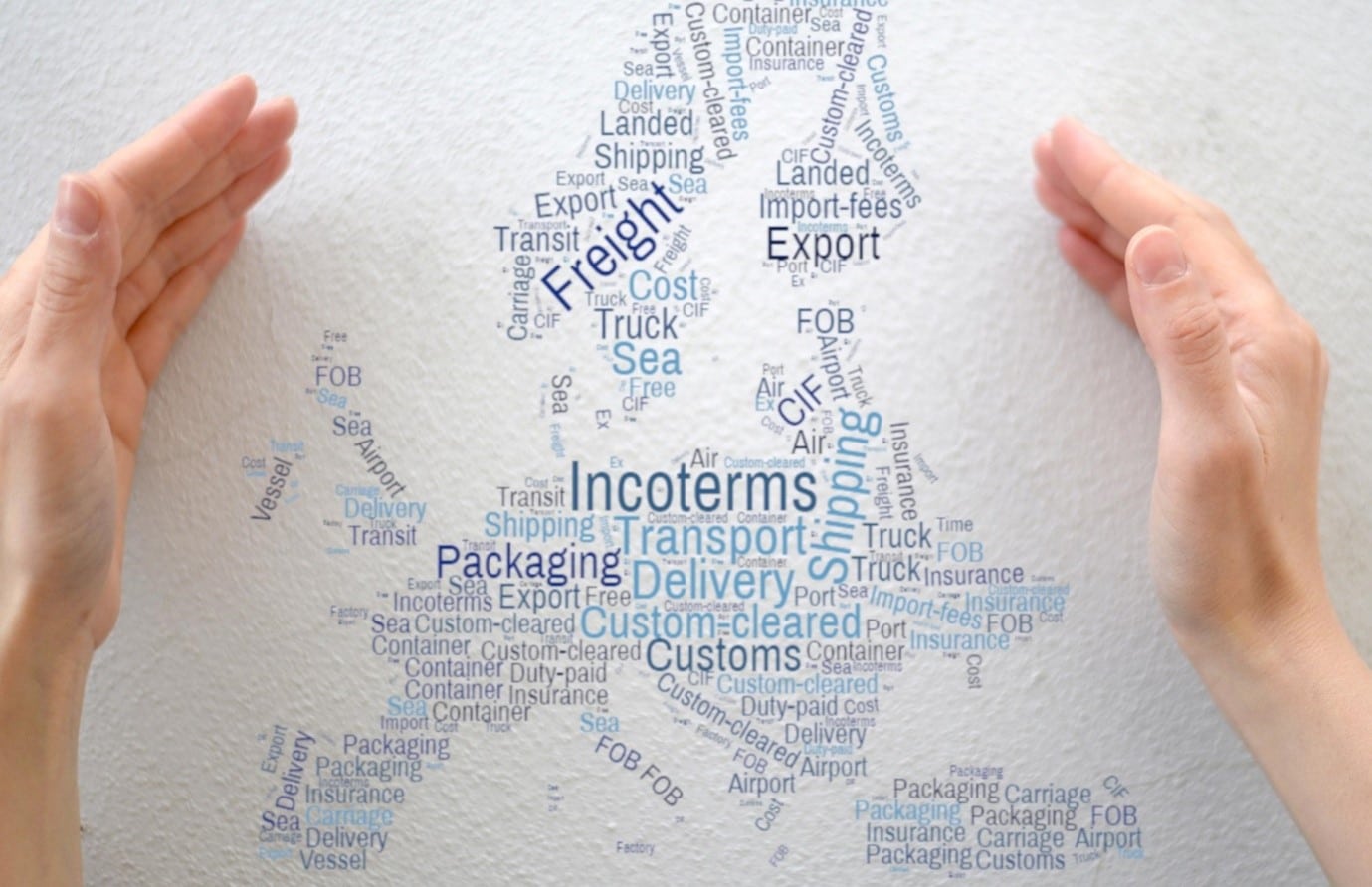What are Incoterms?
Incoterms, or International Commercial Terms, are a series of three-letter trade terms developed by the International Chamber of Commerce (ICC) that relate to international contracts of sale. These terms are used to divide transaction costs and responsibilities between the buyer and the seller and clearly state which party is responsible for shipping, insurance, handling, and other costs.
There are 11 different Incoterms in total, and each one is categorized as either “E” for exports or “I” for imports. The most commonly used Incoterms are EXW (Ex Works), FOB (Free on Board), CIF (Cost, Insurance, and Freight), and DDP (Delivered Duty Paid).
Types of Incoterms
- E terms: Ex Works, FCA, FAS, FOB, CPT, CIP, CFR, CIF
- I terms: DAT, DAP, DDP
Let’s define these terms in more in-depth:
- EXW – Ex Works (named place) states that the seller has the goods ready for collection at their premises by the buyer and that all costs and risks associated with getting the goods from there to the destination country are borne by the buyer.
- FCA – Free Carrier (named place) refers to when the seller hands over the goods, cleared for export, to the carrier nominated by the buyer at the named place.
- FAS – Free Alongside Ship (named port of shipment) indicates that the seller delivers the goods alongside a vessel at the named port of shipment.
- FOB – Free on Board (named port of shipment) is used when the seller delivers the goods to the buyer on board the vessel nominated by the buyer at the named port of shipment, and from that point on, all costs and risks are borne by the buyer.
- CPT – Carriage Paid To (named place of destination) means that the seller pays for the carriage of the goods to the named place of destination, but the buyer bears all risks of loss or damage to the goods from that point.
- CIP – Carriage and Insurance Paid To (named place of destination) is similar to CPT, but with the addition that the seller also pays for the insurance of the goods while in transit.
- CFR – Cost and Freight (named port of destination) states that the seller pays for the carriage of the goods to the named port of destination, but the buyer is responsible for all risks and costs associated with getting the goods from there to their final destination.
- CIF – Cost, Insurance, and Freight (named port of destination) is the same as CFR, but with the addition that the seller also pays for the insurance of the goods while in transit.
- DAT – Delivered at Terminal (named terminal at port or place of destination) means that the seller pays for all costs up to the delivery of the goods to the named terminal at the port or place of destination. The buyer bears all risks and costs associated with getting the goods from there to their final destination.
- DAP – Delivered at Place (named place of destination) states that the seller pays for all carriage costs up to delivering the goods to the named place of destination, and the buyer bears all risks and costs associated with getting the goods from there to their final destination.
- DDP – Delivered Duty Paid (named place of destination) means that the seller pays for all carriage and insurance costs, as well as any import duties and taxes, up to delivering the goods to the named place of destination. The buyer bears all risks associated with getting the goods from there to their final destination.
As you can see, each Incoterm has a different set of responsibilities and risks attached to it, so it’s important to choose the right one when entering into an international contract of sale.
How Incoterms Impact Your Shipping Cost
The type of Incoterm you choose will have a direct impact on your shipping costs. For example, if you choose an E term like FOB or CFR, the seller is responsible for the cost of shipping the goods to the port of export, but the buyer is responsible for the cost of shipping from the port of import.
On the other hand, if you choose an I term like DDP, the seller is responsible for the cost of shipping the goods to the port of import, as well as any customs duties and taxes.
Incoterms for Air Freight
There are four Incoterms that specifically relate to air freight: EXW, FCA, CPT, and CIP.
- EXW (Ex Works): The seller is responsible for making the goods available at their premises. The buyer is responsible for all shipping costs and risks, as well as any customs clearance requirements.
- FCA (Free Carrier): The seller is responsible for making the goods available to the carrier nominated by the buyer. The buyer is responsible for all shipping costs and risks, as well as any customs clearance requirements.
- CPT (Carriage Paid To): The seller is responsible for paying the shipping costs to the destination port. The buyer is responsible for all risks and any customs clearance requirements.
- CIP (Carriage and Insurance Paid To): The seller is responsible for paying the shipping costs and insurance to the destination port. The buyer is responsible for all risks and any customs clearance requirements.
Why are Incoterms Important?
Incoterms are important because they provide a common language for international trade. They help to clearly define the responsibilities of the buyer and the seller, as well as the costs associated with shipping.
Some of the reasons to use Incoterms include:
- Avoid Miscommunication: By using Incoterms, you can avoid miscommunication and misunderstanding between the parties involved in a transaction. Imagine trying to explain to a supplier in China that you need the goods “delivered to your door” without using any industry-standard terminology.
- Reduce Shipping Costs: By using Incoterms, you can reduce shipping costs by clearly defining who is responsible for what. For example, if you are the buyer and you choose an I term like DDP, the seller will be responsible for the cost of shipping the goods to your door, as well as any customs duties and taxes.
- Protect Your Business: By using Incoterms, you can protect your business by clearly defining the terms of a transaction. For example, if you are the seller and you choose an E term like FOB, the buyer will be responsible for the cost of shipping the goods from your premises to the port of export. This means that if the goods are damaged in transit, you will not be liable.
- Comply with International Trade Laws: By using Incoterms, you can comply with international trade laws and regulations. For example, if you are shipping goods to the European Union, you must use an Incoterm that complies with the EU’s Incoterms 2010 rules.

What Incoterms Should I Use?
The type of Incoterm you should use depends on a number of factors, such as the mode of transport, the type of goods being shipped, and the country of destination. You should also consider your own shipping costs and risks when choosing an Incoterm.
Some of the factors to consider when choosing an Incoterm include:
- Mode of transport: The type of Incoterm you use will depend on the mode of transport. For instance, if you are shipping by sea, you will need to use an Incoterm that specifically relates to maritime transport, such as FOB or CFR.
- Type of goods: The type of Incoterm you use will also depend on the type of goods being shipped. Suppose, if you are shipping perishable goods, you will need to use an Incoterm that specifically relates to perishable goods, such as CIP or DAT.
- Country of destination: The type of Incoterm you use will also depend on the country of destination. For example, if you are shipping to a country with strict customs regulations, you will need to use an Incoterm that specifically relates to customs clearance, such as DDP or CIP.
- Shipping costs: The type of Incoterm you use will also depend on your own shipping costs. For example, if you are shipping by sea and you want the buyer to pay the shipping costs, you will need to use an Incoterm that specifically allows for this, such as CFR or CPT.
- Risks: The type of Incoterm you use will also depend on the risks involved in shipping. For example, if you are shipping by sea and you want the buyer to assume all risks, you will need to use an Incoterm that specifically allows for this, such as FOB or DAT.
Main Differences Specific to a Country
There are some main differences that are specific to a country when it comes to Incoterms. These include:
- Australia: In Australia, the most commonly used Incoterms are FOB, CFR, and CIF.
- Canada: In Canada, the most commonly used Incoterms are FOB and CFR.
- China: In China, the most commonly used Incoterms are FOB and CFR.
- European Union: In the European Union, the most commonly used Incoterms are DAP, DDP, and FCA.
- India: In India, the most commonly used Incoterms are CPT, CIP, and DAT.
- Japan: In Japan, the most commonly used Incoterms are FOB and CFR.
- United States: In the United States, the most commonly used Incoterms are FOB and CFR.
When to Challenge Advice
If you are ever advised to use an Incoterm that you are not familiar with, or that you feel is not appropriate for your transaction, you should challenge the advice. You can do this by asking the person giving the advice to explain the Incoterm and how it will impact your transaction. You should also ask for advice in writing so that you have a record of it.
What Shipping Incoterms Don’t Cover
Shipping Incoterms do not cover everything that is involved in a shipping transaction. For example, they do not cover:
- The price of the goods: Shipping Incoterms only cover the cost of shipping the goods. They do not cover the price of the goods themselves.
- The quality of the goods: Shipping Incoterms only cover the condition of the goods at the time of shipping. They do not cover the quality of the goods themselves.
- The insurance of the goods: Shipping Incoterms only cover the risk of loss or damage to the goods during shipping. They do not cover the insurance of the goods themselves.
Define Named Place in the Sales Contract
When you are using an Incoterm that includes a named place, such as FOB or CPT, you will need to define the named place in the sales contract. The named place is the location where the goods will be handed over from the seller to the buyer. This can be a city, port, airport, or other location.
How Letters of Credit Limit Choice of Incoterm
If you are using a letter of credit to finance your shipping transaction, you will need to use an Incoterm that is compatible with the letter of credit. This means that you will need to use an Incoterm that allows for the payment to be made through the letter of credit. The most common Incoterms that are compatible with letters of credit are FOB and CFR.
Final Thoughts
Incoterms are an important part of any shipping transaction. They define the responsibilities of the buyer and seller, and they impact the cost of shipping.















